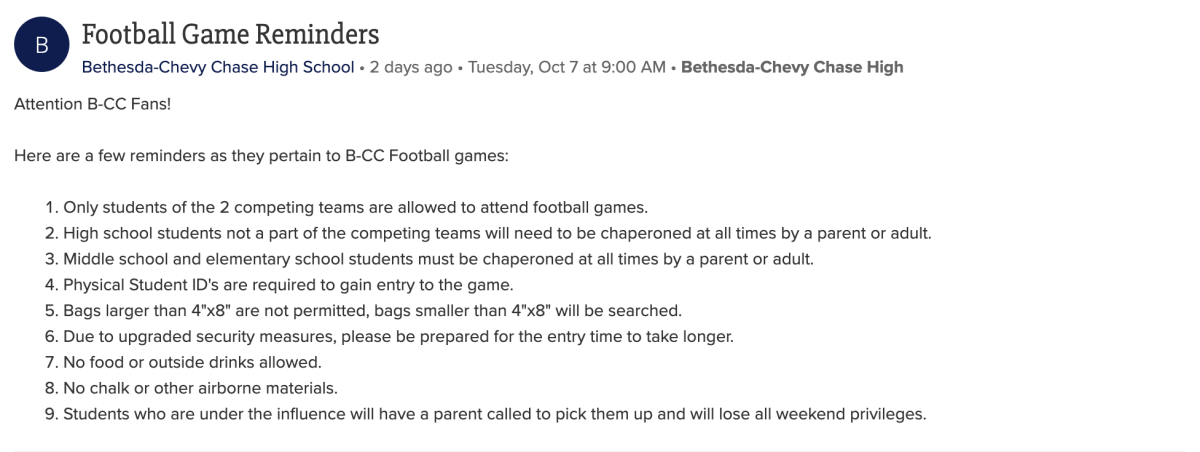According to the most recent data from the Montgomery County Food Council, over 13% of children county-wide are food insecure. A vital part of the solution to childhood hunger is free or reduced price meals at school. MCPS already supports economically disadvantaged students through the Free and Reduced Price Meals (FARMS) program, however most students would benefit from free school meals if they were offered to everyone, not only those who cannot afford lunch. MCPS should ensure free meals every day to every student to increase student health and improve academic outcomes.
Healthy school lunches were a key initiative for former first lady Michelle Obama. According to the University of Washington School of Public Health, “Obama-era school nutrition policy led to better diets.” NPR reports on a 2023 study showing school lunches correlated to potential reductions in childhood obesity. The study showed “significant decreases in BMI measures” for students aged 5-18 who ate school lunches. School lunch is significantly healthier than the average lunch brought from home, supported empirically by a Science Direct study, showing that 89% of packed lunches exceeded the recommended caloric value. The study also found that under 2% of packed lunches met the nutritional food standards of school lunches in terms of energy and nutrients.
With school lunches being so healthy, the most important thing to do is to make them available to more students, more regularly. Intuitively, it makes sense that students would take school lunches more often if they were free. The data supports that intuition. Science Direct’s study also showed that school meal take-up, or the percentage of students opting to eat a school lunch rather than pack one from home, shot up from 30% to 84% when said school meals were free. Junior Shayne Strong-Jacobsen shared, “I used to eat school lunch when it was free. If they made it free again, I would start eating it way more.” Freshman Peder Ballen also stated, “I never eat school lunch but would start if the cost was removed. If the cost is free, I’m all in. But right now, having to pay for it, I’m not interested.” Free meals across MCPS would mean more students taking advantage of school meals and seeing the health benefits they provide.
School lunches correlate to academic benefits, as well. Well-fed students are better able to focus on the classroom, leading to better learning outcome, and alleviating the stress of food insecurity gives students more time to study and prepare for their classes. According to the National Education Association, students who participate in school breakfast programs have improved academic performance and achievement. According to a study from Syracuse University, there was an increase in test scores after the adoption of a universal free meal program. The study, which controlled for limited English proficiency, special education status, and grade level, found a significant increase in test scores in the years following the program’s adoption. Free school meals are also linked to increased attendance. The Center for American Progress reports that in addition to increasing educational attainment, school meals also increase attendance. This is corroborated by a study from the NIH, showing that students at nutritional risk had displayed “significantly poorer attendance [and] punctuality” than their peers. The same study also found a school breakfast program to be an effective solution to nutritional risk among students. Offering free meals to all students would mean a more present and academically primed student body.
The FARMS program currently in place in MCPS falls short. One key issue with the current system is stigma. As reported by Health Affairs, “Basing access to school meals on income contributes[s] to a sense of stigma or shame for students who… worry about being classified as the ‘poor kid.’” This leads many students to go hungry rather than face the harassment of their peers. Another issue with the current system is that it isn’t enough. Even those who get reduced prices still face hundreds of dollars worth of payments to get breakfast and lunch each day. Eliminating the means test on affordable school meals would eliminate these problems for all, including those who can afford to pack a lunch.
Overall, MCPS must make affordable, healthy meals available to all. This is not a difficult decision as this would improve health and educational outcomes for students and fix the flaws of the current reduced-price meals program.








































